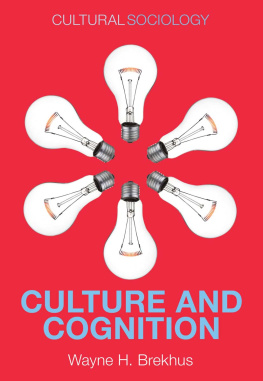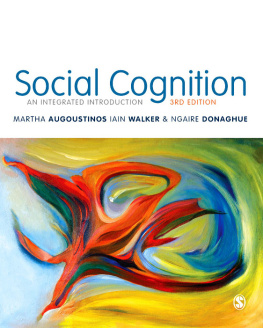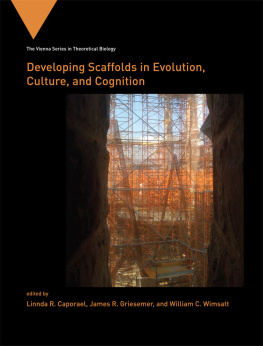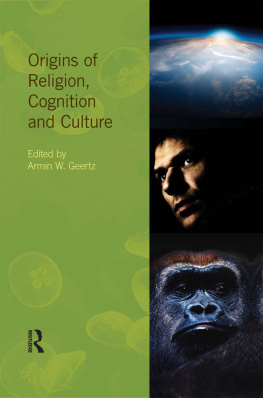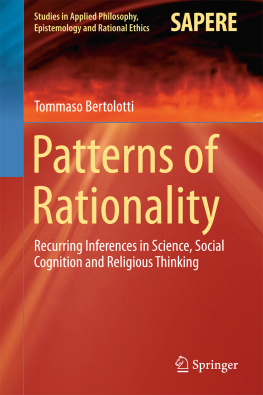
Cultural Sociology series
Culture and Cognition: Patterns in the Social Construction of Reality, Wayne H. Brekhus
Protest: A Cultural Introduction to Social Movements, James M. Jasper
The Culture of Markets, Frederick F. Wherry
Culture and Cognition
Patterns in the Social Construction of Reality
Wayne H. Brekhus
polity
Copyright Wayne H. Brekhus 2015
The right of Wayne H. Brekhus to be identified as Author of this Work has been asserted in accordance with the UK Copyright, Designs and Patents Act 1988.
First published in 2015 by Polity Press
Polity Press
65 Bridge Street
Cambridge CB2 1UR, UK
Polity Press
350 Main Street
Malden, MA 02148, USA
All rights reserved. Except for the quotation of short passages for the purpose of criticism and review, no part of this publication may be reproduced, stored in a retrieval system, or transmitted, in any form or by any means, electronic, mechanical, photocopying, recording or otherwise, without the prior permission of the publisher.
ISBN-13: 978-0-7456-9822-9
A catalogue record for this book is available from the British Library.
Library of Congress Cataloging-in-Publication Data
Brekhus, Wayne.
Culture and cognition : patterns in the social construction of reality / Wayne H. Brekhus.
pages cm
Includes bibliographical references and index.
ISBN 978-0-7456-7176-5 (hardback : alk. paper) -- ISBN 978-0-7456-7177-2 (pbk. : alk. paper) 1. Cognition and culture. 2. Social psychology. I. Title.
BF311.B7224 2015
306.42--dc23
2015004488
The publisher has used its best endeavours to ensure that the URLs for external websites referred to in this book are correct and active at the time of going to press. However, the publisher has no responsibility for the websites and can make no guarantee that a site will remain live or that the content is or will remain appropriate.
Every effort has been made to trace all copyright holders, but if any have been inadvertently overlooked the publisher will be pleased to include any necessary credits in any subsequent reprint or edition.
For further information on Polity, visit our website: www.politybooks.com
Contents
Guide
Print Page Numbers
Acknowledgments
I am indebted to several people who have contributed greatly to my thinking during the writing of this book. Eviatar Zerubavel introduced me to the exciting analytic possibilities of studying culture and cognition many years ago when I was a graduate student at Rutgers University in the 1990s. Eviatars intellectual passion and ongoing support and friendship continue to inspire me. I have benefitted tremendously from our many stimulating conversations about cognitive sociology. My thinking about culture and cognition has been sharpened by the valuable insights of Karen Danna, Tom DeGloma, Asia Friedman, Daina Cheyenne Harvey, Kyle Puetz, and J. T. Thomas, who all read and commented on an early draft. Each of them guided me to consider new angles that have expanded the breadth and depth of this book. I am grateful for the steady encouragement and enthusiasm of Jonathan Skerrett, my editor at Polity. He has advised me well throughout the process. I am also indebted to Fiona Sewell at Polity for her very thorough, efficient, and attentive copy-editing. Finally, I thank my wife, Rachel Brekhus, who provided an extra set of eyes and a full measure of moral support whenever they were needed.
Introduction: Culture and Cognition in Sociology
This book explores the cultural sociology of cognition. Despite the quite common feeling that our thoughts are individualistic in nature private and uniquely our own thinking is a distinctly social phenomenon. Our thoughts are co-produced within the cultures, subcultures, social networks, communities, and organizations that we belong to. The social construction of reality, an idea first defined and popularized by Peter Berger and Thomas Luckmann (1966), is widely discussed in introductory sociology courses and is an operating ground assumption for sociologists, though often taken for granted as background rather than explicitly outlined. Cognitive sociologists, in studying the cultural and social aspects of cognition, engage with the task of demonstrating variations and patterns in the social construction of reality. In recent years there has been growing scholarly interest in studying the nature of the relationship between culture and cognition. Within sociology, this interest cuts across many topical subfields, including cultural sociology, the sociology of race, social control and deviance, inequalities, economic sociology, social organizations, social movements, environmental sociology, urban sociology, and the sociology of identity. Sociologists of culture and cognition are contributing to a rapidly expanding body of work on how thought and action are intricately linked to cultural and social life.
The approach I take in this book is to discuss sociological research on culture and cognition across a range of cultural, subcultural, identity affiliational, and organizational settings and across varying levels of culture from macrocultures to microcultures. In doing so, I intend to illustrate both cognitive variation and general social patterns in sociocultural cognition. Here I take the social pattern analysis approach of Eviatar Zerubavel (2007), who recommends using multi-contextual evidence both to display cultural variation and diversity, and to locate general social patterns in that diversity. I organize the main body of this book around key cognitive processes (perception, classification, meaning and metaphor, identity, memory, and time construction) rather than around theoretical camps, and bring contributions from the different theoretical and methodological traditions together in order to better illuminate and understand these processes. In this introductory chapter, however, I provide a little background on sociological traditions in culture and cognition as a way of illustrating some of the key methodological and theoretical debates in the field. I will then draw from these varying approaches throughout the book to move across levels of scale, traverse both the quotidian and the morally salient, and demonstrate how culture and cognition can motivate social action and produce and sustain inequalities and simultaneously be produced by inequalities. Before I turn to these traditions, and then to the cognitive processes they study, I offer an illustrative case for why social scientists should study culture and cognition in the first place.
Why culture and cognition?
Why study culture and cognition? What does a cultural approach offer to the study of human thought and the human mind? To address this question it is worth noting that we do not think as generic rational human actors, but rather, we interpret the world from specific social standpoints based on the societies we live in, the communities we inhabit, and the social networks we belong to.
For fun, I begin with revelations about a peculiar group that demonstrates a unique, culturally specific thought style and view of social perception. In 2010 three social scientists (Joe Henrich, an anthropologist, and Steven Heine and Ara Norenzyan, two psychologists) published an article in Behavioral and Brain Sciences entitled The Weirdest People in the World? In this article, the authors looked at a number of classical social psychological experiments thought to explain human social behavior and discovered that the findings of these studies were not replicable in many other cultures. Years of established scholarly wisdom had assumed that these experimental studies revealed evolved psychological traits common to universal human perception and cognitive processes, when in fact the subjects for the experiments came almost exclusively from industrialized Western cultures. These studies, presumed to be measuring human cognition, were actually measuring the unique cognition of a specific cultural group. By compiling cross-cultural research on common experiments such as the prisoners-dilemma-style ultimatum game, and visual perceptions of optical illusions, the authors demonstrated that significant elements of human thought are as much cultural and social as they are neurological.
Next page
